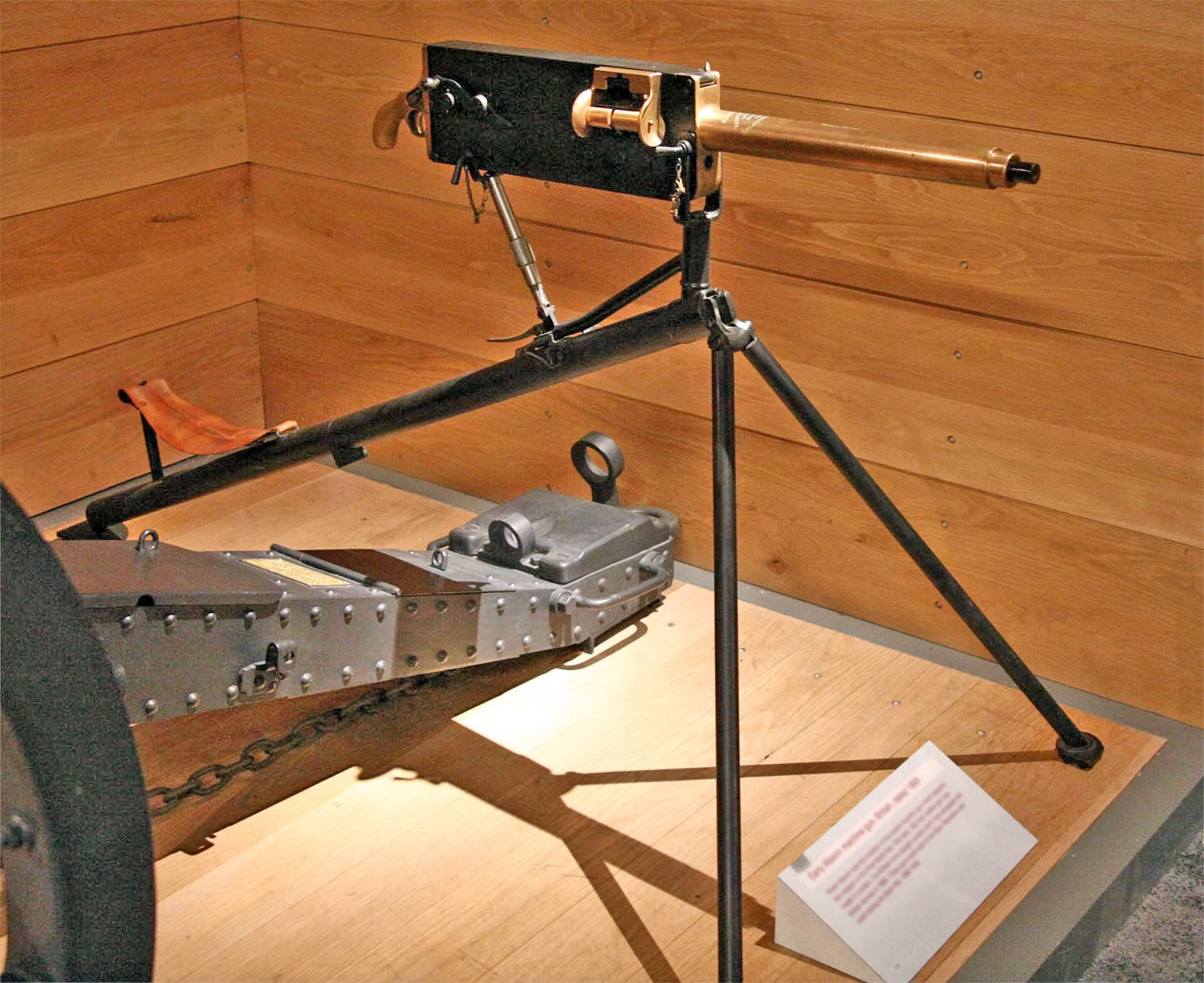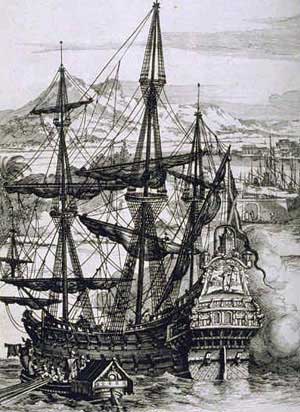|
Maxim Machine Gun
The Maxim gun is a Recoil operation, recoil-operated machine gun invented in 1884 by Hiram Maxim, Hiram Stevens Maxim. It was the first automatic firearm, fully automatic machine gun in the world. The Maxim gun has been called "the weapon most associated with imperial conquest" by historian Martin Gilbert, and was heavily used by Colonialism, colonial powers during the "Scramble for Africa". Afterwards, Maxim guns also saw extensive usage by different armies during the Russo-Japanese War, the World War I, First and World War II, Second World Wars, as well as in contemporary conflicts. The Maxim gun was greatly influential in the development of machine guns, and it has multiple variants and derivatives. Design The Maxim gun featured one of the earliest recoil-operated firing systems in history. Energy from recoil acting on the breech block is used to eject each spent cartridge and insert the next one. Maxim's earliest designs used a 360-degree rotating cam to reverse the move ... [...More Info...] [...Related Items...] OR: [Wikipedia] [Google] [Baidu] |
Heavy Machine Gun
A heavy machine gun (HMG) is significantly larger than light, medium or general-purpose machine guns. HMGs are typically too heavy to be man-portable (carried by one person) and require mounting onto a weapons platform to be operably stable or tactically mobile, have more formidable firepower, and generally require a team of personnel for operation and maintenance. There are two classes of weapons generally defined as HMGs: * The historical definition refers to machine guns, typically chambered in standard full-power cartridges, that are identified as being "heavy" due to their weight and cumbersomeness, which prevents infantrymen from transporting them on foot. Examples include the Maxim machine gun and M1917 Browning machine gun. * The modern definition refers to "heavy caliber" machine guns, pioneered by the German Empire's MG 18 TuF which was a Maxim derivative chambered in 13.2×92mmSR fielded near the end of World War I. They are designed to provide increased effec ... [...More Info...] [...Related Items...] OR: [Wikipedia] [Google] [Baidu] |
Philippine Revolution
The Philippine Revolution ( or ; or ) was a war of independence waged by the revolutionary organization Katipunan against the Spanish Empire from 1896 to 1898. It was the culmination of the 333-year History of the Philippines (1565–1898), colonial rule of Spain in the archipelago. The Captaincy General of the Philippines, Philippines was one of the last major colonies of the Spanish Empire, which had already suffered Spanish American wars of independence, a massive decline in the 1820s. Cuban War of Independence, Cuba rebelled in 1895, and in 1898, the United States Spanish–American War, intervened and the Spanish soon capitulated. In June, Philippine revolutionaries Philippine Declaration of Independence, declared independence. However, it was not recognized by Spain, which sold the islands to the United States in the Treaty of Paris (1898), Treaty of Paris. Led by Andrés Bonifacio, the Katipunan was formed in secrecy in 1892 in the wake of the nascent La Liga Filipina ... [...More Info...] [...Related Items...] OR: [Wikipedia] [Google] [Baidu] |
Maji Maji Rebellion
The Maji Maji Rebellion (, ) was an armed rebellion of Africans against German colonial rule in German East Africa (modern-day Tanzania). The war was triggered by German colonial policies designed to force the indigenous population to grow cotton for export. The war lasted from 1905 to 1907, during which 75,000 to 300,000 died, overwhelmingly from famine. The end of the war was followed by a period of famine, known as the Great Hunger (''ukame''), caused in large part by the scorched-earth policies used by governor von Götzen to suppress the rebellion. These tactics have been described by scholars as genocidal. The name may have been the origin of the term for the 'Mau Mau rebellion' in Kenya five decades later. Causes After the Scramble for Africa among the major European powers in the 1880s, Germany reinforced its hold on several formal African colonies. These were German East Africa (Tanzania, Rwanda, Burundi, and part of Mozambique), German Southwest Africa (present-day N ... [...More Info...] [...Related Items...] OR: [Wikipedia] [Google] [Baidu] |
Herero War
The Herero Wars were a series of colonial wars between the German Empire and the Herero people of German South West Africa (present-day Namibia). They took place between 1904 and 1908. Background Pre-colonial South-West Africa The Hereros were cattle grazers, occupying most of central and northern South West Africa. Under the leadership of Jonker Afrikaner, who died in 1861, and then later under the leadership of Samuel Maharero, they had achieved supremacy over the Nama and Orlam peoples in a series of conflicts that had in their later stages, seen the extensive use of fire-arms obtained from European traders. German colonization In the early 1880s, the German statesman Otto von Bismarck, reversing his previous rejection of colonial acquisitions, decided on a policy of imperial expansion. In 1882 Bismarck gave permission to Adolf Lüderitz to obtain lands which Germany would bring within its "protection", under the conditions that a port was established within the territorie ... [...More Info...] [...Related Items...] OR: [Wikipedia] [Google] [Baidu] |
Russo-Japanese War
The Russo-Japanese War (8 February 1904 – 5 September 1905) was fought between the Russian Empire and the Empire of Japan over rival imperial ambitions in Manchuria and the Korean Empire. The major land battles of the war were fought on the Liaodong Peninsula and near Shenyang, Mukden in Southern Manchuria, with naval battles taking place in the Yellow Sea and the Sea of Japan. Russia had pursued an expansionist policy in Siberia and the Russian Far East, Far East since the reign of Ivan the Terrible in the 16th century. At the end of the First Sino-Japanese War, the Treaty of Shimonoseki of 1895 had ceded the Liaodong Peninsula and Lüshun Port, Port Arthur to Japan before the Triple Intervention, in which Russia, Germany, and France forced Japan to relinquish its claim. Japan feared that Russia would impede its plans to establish a sphere of influence in mainland Asia, especially as Russia built the Trans-Siberian Railway, Trans-Siberian Railroad, began making inroads in K ... [...More Info...] [...Related Items...] OR: [Wikipedia] [Google] [Baidu] |
British Expedition To Tibet
The British expedition to Tibet, also known as the Younghusband expedition, began in December 1903 and lasted until September 1904. The expedition was effectively a temporary invasion by British Indian Army, British Indian Armed Forces under the auspices of the Tibet Frontier Commission, whose purported mission was to establish diplomatic relations and resolve the dispute over the border between Tibet and Kingdom of Sikkim, Sikkim.Landon, P. (1905). ''The Opening of Tibet'' Doubleday, Page & Co, New York. In the nineteenth century, the British had conquered Konbaung dynasty, Burma and Sikkim, with the whole southern flank of Tibet coming under the control of the British Raj, British Indian Empire. Tibet was ruled by the 13th 13th Dalai Lama, Dalai Lama under the Ganden Phodrang government as a Himalayas, Himalayan state under the Tibet under Qing rule, protectorate (or suzerainty) of the Chinese Qing dynasty until the 1911 Revolution, after which a Tibet (1912–1951), period of ... [...More Info...] [...Related Items...] OR: [Wikipedia] [Google] [Baidu] |
Anglo–Aro War
The Anglo-Aro War (1901–1902) was a conflict between the Aro Confederacy in present-day Eastern Nigeria, and the British Empire. The war began after increasing tension between Aro leaders and the British after years of failed negotiations. Cause of the war The Aro Confederacy, whose powers extended across Eastern Nigeria and beyond, was challenged in the last decades of the 19th century by increasing British colonial penetration of the hinterland. The Aro people and their allies resisted the British penetration due to a combination of factors, included economic, political and religious concerns. Reasons for the war advanced by Sir Ralph Moor, the British High Commissioner of the Nigerian Coast Protectorate, included: According to American scholar Jeffrey Ian Ross, the Aro peoples usage of divinatory practices in shrines dedicated to the god ''Ibin Ukpabi'' was a critical element in their slavery practises, which was one of the factors that led to the outbreak of the An ... [...More Info...] [...Related Items...] OR: [Wikipedia] [Google] [Baidu] |
Bafut Wars
The Bafut Wars were a series of wars fought in the early 20th century between the troops of the Fon of Bafut and German-backed troops of neighbouring fondoms and German troops. The wars ultimately led to a defeat for the Fon of Bafut, forcing him into exile, and making the Fondom of Bafut part of the German protectorate of Kamerun. During the Bafut Wars, the strategic landscape was characterized by two distinct types of settlements. Primarily, there were the semi-autonomous villages, each governed by its own chief known as the atangchuo, who played a crucial role as the war planner. These villages operated with a degree of independence but were intricately linked to the central authority under various conditions that dictated their relationship dynamics. These conditions often influenced alliances, resource sharing, and military strategies during the conflicts that ensued in the region. Timeline 1889: The German explorer Eugene Zintgraff visits the town of Bafut as one of ... [...More Info...] [...Related Items...] OR: [Wikipedia] [Google] [Baidu] |
War Of The Golden Stool
The War of the Golden Stool, also known as the Yaa Asantewaa War, the Third Ashanti Expedition, the Ashanti Uprising, or variations thereof, was a campaign in 1900 during the series of conflicts between the United Kingdom and the Ashanti Empire (later Ashanti Region), an autonomous state in West Africa that fractiously co-existed with the British and its vassal coastal tribes. After several prior wars with British troops, Ashanti was once again occupied by British troops in January 1896.'The Location of Administrative Capitals in Ashanti, Ghana, 1896-1911' by R. B. Bening in The International Journal of African Historical Studies, Vol. 12, No. 2 (1979) pg. 210 In 1900 the Ashanti staged an uprising. The British suppressed the revolt and captured the city of Kumasi. Ashanti's traditional king, the Asantehene, and his counselors were deported. The outcome was the annexation of Ashanti by the British so that it became part of His Majesty's dominions and a British Crown Colony with ... [...More Info...] [...Related Items...] OR: [Wikipedia] [Google] [Baidu] |
Boxer Rebellion
The Boxer Rebellion, also known as the Boxer Uprising, was an anti-foreign, anti-imperialist, and anti-Christian uprising in North China between 1899 and 1901, towards the end of the Qing dynasty, by the Society of Righteous and Harmonious Fists, known as the "Boxers" in English due to many of its members having practised Chinese martial arts, which at the time were referred to as "Chinese boxing". It was defeated by the Eight-Nation Alliance of foreign powers. Following the First Sino-Japanese War, villagers in North China feared the expansion of foreign Spheres of influence#China, spheres of influence and resented the extension of privileges to Christian missionaries, who used them to shield their followers. In 1898, North China experienced several natural disasters, including the Yellow River flooding and droughts, which Boxers blamed on foreign and Christian influence. Beginning in 1899, the movement spread across Shandong and the North China Plain, destroying foreign pro ... [...More Info...] [...Related Items...] OR: [Wikipedia] [Google] [Baidu] |
Second Boer War
The Second Boer War (, , 11 October 189931 May 1902), also known as the Boer War, Transvaal War, Anglo–Boer War, or South African War, was a conflict fought between the British Empire and the two Boer republics (the South African Republic and Orange Free State) over Britain's influence in Southern Africa. The Witwatersrand Gold Rush caused a large influx of "Uitlander, foreigners" (''Uitlanders'') to the South African Republic (SAR), mostly British from the Cape Colony. As they, for fear of a hostile takeover of the SAR, were permitted to vote only after 14 years of residence, they protested to the British authorities in the Cape. Negotiations failed at the botched Bloemfontein Conference in June 1899. The conflict broke out in October after the British government decided to send 10,000 troops to South Africa. With a delay, this provoked a Boer and British ultimatum, and subsequent Boer Irregular military, irregulars and militia attacks on British colonial settlements in Natal ... [...More Info...] [...Related Items...] OR: [Wikipedia] [Google] [Baidu] |
Philippine–American War
The Philippine–American War, known alternatively as the Philippine Insurrection, Filipino–American War, or Tagalog Insurgency, emerged following the conclusion of the Spanish–American War in December 1898 when the United States annexed the Philippine Islands under the Treaty of Paris (1898), Treaty of Paris. Philippine nationalists constituted the First Philippine Republic in January 1899, seven months after signing the Philippine Declaration of Independence. The United States did not recognize either event as legitimate, and tensions escalated until fighting commenced on February 4, 1899, in the Battle of Manila (1899), Battle of Manila. Shortly after being denied a request for an armistice, the Philippine Council of Government issued a proclamation on June 2, 1899, urging the people to continue the war. Philippine forces initially attempted to engage U.S. forces conventionally but transitioned to guerrilla tactics by November 1899. Philippine President Emilio Aguinaldo w ... [...More Info...] [...Related Items...] OR: [Wikipedia] [Google] [Baidu] |








